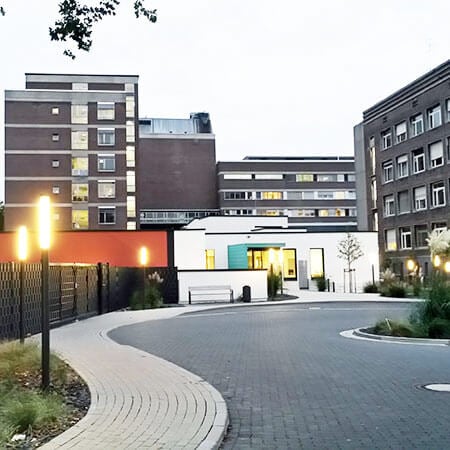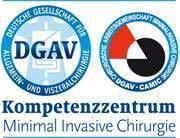Colon Cancer — Da Vinci treatment in the Best Hospitals in the World
Treatment prices are regulated by national law of the corresponding countries, but can also include additional hospital coefficients. In order to receive the individual cost calculation, please send us the request and medical records.

Department of General and Abdominal Surgery, Colorectal Surgery, Endocrine Surgery and Hernia Surgery
The Department of General and Abdominal Surgery, Colorectal Surgery, Endocrine Surgery and Hernia Surgery offers the full range of modern surgical interventions in the areas of its specialization. Every year, the medical facility performs more than 2,500 surgical interventions on an inpatient and outpatient basis. The department has vast clinical experience in the field of minimally invasive surgery, which allows the patient to avoid severe pain and prolonged hospitalization. In addition, the department offers robotic surgery using the most modern models of the da Vinci surgical system. The medical facility has the status of the Reference Center for Minimally Invasive Surgery and Hernia Surgery. Surgical treatment of cancer is one of the department's clinical priority focuses. A large number of da Vinci robot-assisted interventions are performed here for gastrointestinal cancers. The department holds a leading position in the use of the da Vinci surgical system in the treatment of rectal and sigmoid cancer patients. The operating rooms of the medical facility are equipped with the very latest technology, while hygiene and safety standards are at the highest level as well. Prior to surgery, the patient undergoes a comprehensive examination. Doctors also assess the risks of the upcoming operation and its expected results. With appropriate clinical indications, preference is always given to minimally invasive surgery.







Department of General, Abdominal, Transplant, Hepatopancreatobiliary, Colorectal, Endocrine, Bariatric Surgery and Hernia Surgery
The Department of General, Abdominal, Transplant, Hepatopancreatobiliary, Colorectal, Endocrine, Bariatric Surgery and Hernia Surgery provides the full range of services in the areas of its specialization and holds a leading position at the national and international levels in terms of the number of surgical interventions performed and their success. Of particular interest are operations for treating diseases of the bowel, stomach, esophagus, pancreas, liver, gallbladder, and bile ducts, and endocrine glands. The department's doctors have excellent skills in the surgical treatment of cancer, surgery for liver, kidney, pancreas, and small intestine transplants, and operations for morbid obesity. The department's operating rooms are the pride of the medical facility, since they have all the necessary technical options for performing operations with the da Vinci surgical system, image-guided interventions, and endoscopic surgical procedures, which are characterized by minimal trauma rates.







Department of General and Abdominal Surgery, Hepatopancreatobiliary Surgery, Colorectal Surgery, Hernia Surgery
According to the Focus magazine, the Department of General and Abdominal Surgery, Hepatopancreatobiliary Surgery, Colorectal Surgery, Hernia Surgery is one of the best medical facilities in Germany for the treatment of colon, stomach, esophageal, pancreatic, and liver cancers! The main specialization is surgical procedures for malignancies in the intestines, stomach, esophagus, liver, pancreas, and rectum. The department also successfully operates on patients with chronic inflammatory bowel disease such as Crohn's disease and ulcerative colitis. The department's therapeutic capabilities are complemented by the treatment of gastroesophageal reflux disease, sigmoid diverticulum, umbilical and inguinal hernias, cholelithiasis, and anorectal disorders. Nearly all surgical procedures are performed using minimally invasive surgical techniques – the department has the status of a Center of Excellence for Minimally Invasive Surgery certified by the German Society for General and Vascular Surgery (DGAV). The medical facility also offers innovative da Vinci robot-assisted surgery. These procedures have become the standard of care for colon cancer, rectal cancer, and colonic diverticulosis. Each clinical case is evaluated individually and the surgical procedure is carefully planned. Surgeries are performed in high-tech operating rooms in compliance with hygiene and safety standards.






Colon cancer is one of the oncological diseases in the treatment of which the greatest progress has been achieved in the 21st century. Patient survival rates are increasing due to the introduction of new treatment methods. In addition, treatment is becoming less traumatic and safer for patients. Laparoscopic and robot-assisted surgeries have replaced open surgeries to remove colon tumors. They are performed at many clinics abroad. You can travel to one of the developed countries to be cured of cancer with the help of a robot-assisted colon resection. The cost of da Vinci surgery for colon cancer ranges between 20,400 EUR and 40,700 EUR.
Content
- At what stage can robot-assisted surgery be performed?
- What is robot-assisted colon surgery?
- Why is it worth undergoing your treatment abroad?
Doctors remove a part of the colon and lymph nodes through short abdominal incisions using a robotic surgeon. Such operations are less traumatic and safer. Additional treatments can be used to suppress metastases in stages 3-4 of cancer.
You can undergo your treatment at the University Hospital of Ludwig Maximilian University of Munich, the Charite University Hospital Berlin, or the University Hospital Marburg.
You do not have to worry about anything as the specialists from the Booking Health company will take care of the organization of your trip. They will provide you with a list of specialized hospitals, tell you about treatment methods, make an appointment for the near future, help you to come to the hospital, provide an interpreter, and a personal coordinator. Booking Health will support you until you return home after the completion of your successful treatment.
At what stage can robot-assisted surgery be performed?
A colon resection can be performed at any stage, from the very first to the most advanced. Even if distant metastases have spread, which are most often found in the liver, removal of the primary tumor can increase life expectancy by many years. In addition, a patient will require chemotherapy and metastasis-directed therapy, such as liver resection, ablation, or chemoembolization.
Surgery for colon cancer treatment is usually performed using an open surgical technique. Doctors make a large abdominal incision, cut through the colon above and below the tumor with a few extra centimeters of healthy tissue, and suture the ends together or form a colostomy if the operation is due to complications.
Surgeons in developed countries also use a surgical laparoscopic resection and a robot-assisted colon resection. These operations are minimally traumatic as they are performed through short abdominal incisions. Studies show that they are comparable in effectiveness to open surgical interventions, but only if you undergo your treatment at specialized centers and doctors have already performed a large number of such operations.
What is robot-assisted colon surgery?
Robot-assisted surgery is a higher level of development of laparoscopic surgery. Now the tools no longer need to be managed manually. Robotic hands perform the necessary manipulations, and a doctor is at a distance from a patient and controls the system with a remote control.
Here are some benefits of robot-assisted surgery over conventional laparoscopic operations:
- greater scope for manipulators;
- a 3D image that is very clear;
- there is no hand tremor;
- the possibility of transforming the usual movements of the surgeon's hands into microsurgical manipulations to effectively work with blood vessels and nerves.
Why is it worth undergoing your treatment abroad?
Healthcare facilities in developed countries use the latest treatment methods, which are effective even in the advanced stages of cancer. These are not only robot-assisted operations, but also cytoreductive interventions, such as CRS and HIPEC (hyperthermic intraperitoneal chemoperfusion), embolization or chemoembolization for liver metastases, and therapy with lutetium-177-DOTATATE.
If you choose to undergo your treatment abroad, you can expect good results, a minimal risk of complications, and a high quality of life after surgery. After removing a tumor, doctors restore the continuity of the digestive tract and provide an ability for self-defecation. If robot-assisted Da Vinci treatment is performed, you will lose a minimum of blood and quickly recover from the operation.
You are welcome to visit the Booking Health website to find prices and make your appointment for diagnostics, treatment, and general rehabilitation at the best price. We will help you to select the most suitable hospitals abroad and fully organize your trip for diagnostics, treatment, or postoperative recovery.
Authors:
The article was edited by medical experts, board-certified doctors Dr. Nadezhda Ivanisova and Dr. Vadim Zhiliuk. For the treatment of the conditions referred to in the article, you must consult a doctor; the information in the article is not intended for self-medication!
Sources:

